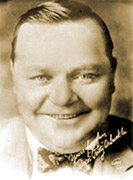This is an old revision of this page, as edited by Garryq (talk | contribs) at 15:57, 16 April 2004 (Add pictures and para re return to films). The present address (URL) is a permanent link to this revision, which may differ significantly from the current revision.
Revision as of 15:57, 16 April 2004 by Garryq (talk | contribs) (Add pictures and para re return to films)(diff) ← Previous revision | Latest revision (diff) | Newer revision → (diff)
Roscoe Conkling Arbuckle (March 24, 1887 - June 29, 1933) was an American silent film comedian who gained the nickname "Fatty" (a name that he hated, and only used professionally) from his portly frame and who is best known for his involvement in the "Fatty Arbuckle scandal". He began his career with the Selig Polyscope Company in 1908 and soon after that he was a star in the Keystone Kops comedies, eventually leaving and starring in a series of short films that won him acclaim and fortune around the world; at the height of his popularity, he was outshone only by Charlie Chaplin. He also played together with Chester Conklin. He discovered Buster Keaton and made him a star; the duo became fast friends off the set.
Roscoe Arbuckle's career is seen by many film historians as one of the great tragedies of Hollywood. At the height of his career, he suddenly found himself arrested and placed on trial for his role in the death of rising starlet Virginia Rappe - a charge he was acquitted of, though the case had to be tried three times before Arbuckle was pronounced innocent. The resulting infamy destroyed his career and his personal life.
File:Arbuckle-Roscoe-sig.jpgHis case has been examined by scholars and historians over the years, and it is believed by most serious historians that Arbuckle was indeed an innocent man.
The Arbuckle case was one of three major scandals that rocked Hollywood, and led to calls for reform of the "indecency" being promoted by motion pictures. It resulted in the creation of the Production Code, which set standards for decency in Hollywood films.
Arbuckle tried to return to moviemaking, but audiences shunned him and he retreated into alcoholism - in the words of his first wife "Roscoe only seemed to find solace and comfort in a bottle". Buster Keaton attempted to help Arbuckle by letting him work on Keaton's feature films (Arbuckle has co-directing credit on Keaton's Sherlock Jr. under the pseudonym of "Will B. Goodrich"), but Arbuckle had become irritable and difficult to control. Shortly before marrying for the third time, to Addie McPhail, Arbuckle signed a contract with Jack Warner to star in six two reel short comedies, using his own name. He finished the last of the two reelers on 28 June 1933, and was signed by Warner Brothers to make a feature length film.
Roscoe Arbuckle died from heart failure on 29 June 1933, in New York, New York.
Buster Keaton stated repeatedly that Roscoe died of a broken heartHe died prematurely from heart failure in 1933 in Hollywood, California. Buster Keaton stated repeatedly that Roscoe died of a broken heart. Roscoe was cremated and his ashes scattered in the Pacific Ocean by his third wife Addie McPhail, although it was erronously reported that he had been interred in the Holy Cross Cemetery in Culver City, California.